#disabled representation in media
Text

Happy Disability Pride Month!
July is Disability Pride Month, so I decided that this would be the best time to post.
As a disabled woman, It has always been a feature, but it's only really fully hit me just how little representation we have in media. (Though, I will note, neurodivergencies are being significantly more represented as of late, which makes me happy)
Just think for a second when was the last time you saw a disabled character who:
1. Is a named character
2. Has a NAMED disability and/or the effects are PROPERLY described (the specific name of the disability is brought up)
3. Their disability isn't a plot device (it is only really there in order to help something happen in the plot)
4. It isn't just a superpower that the character treats as if it's the worst thing
E.g ‘Oh no, I have the power to control lightning but it makes my life so hard’ (unless it actually legitimately stops them from doing things or makes it difficult to do certain things- you get what I mean)
And this last one is just a suggestion, but the only disabilities I really see, are caused by things- (e.g Prof. X) and don't get me wrong! That is JUST as valid. It's just that- it's the ONLY thing I ever seem to see. I never see anyone with Cerebral Palsy for example- (1 in every 500 have some form of it) which is a disability that people have from birth, it is the second most common disability in the world.
(Top three are Arthritis, Cerebral Palsy and Spinal Chord Injuries)
I'm just- sick and tired of either not seeing any representation, or a random background character with no name and no description that the producers just looked at had were like- ‘Just throw them in a wheelchair! It gives them character and if gets us bonus points for inclusivity!’
Again- don't get me wrong. People who use wheelchairs are COMPLETELY valid, it's just that it's often an easy get-out-of-jail-free card in writing.
So yeah. I want- no- DEMAND to see myself and people like me, represented.
(Also, here. Have ‘Sunflower’ the song. I’m making it part of my campaign because y’know- sunflowers.)
#disability#disabilties#disabled#disabled representation#disability pride#disability pride month#sunflower#hidden disability#disabilities in media#disabled representation in media#disabled rant#disability awareness#physical disability#mental disability#disabled characters#disabilty in media#cripple punk#Yes this does include neurodiverse people too
2 notes
·
View notes
Text
The Jaws Effect and what it means for media representation
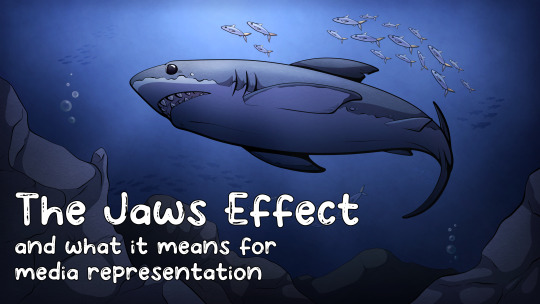
The Jaws Effect is the name of a phenomenon that described the panic and fear that sprang up around sharks, fuelled by Steven Spielberg's movie, Jaws. While the fear of sharks and other marine predators had always been a thing, Jaws launched the fear of sharks, and Great White Sharks in particular, to new (and mostly unfounded) heights. Most people will never encounter a real-life shark and so their only knowledge about the creatures come from movies and other forms of entertainment. Entertainment that largely portrayed them as mindless, unfeeling killing machines. After Jaws, sharks became a staple in the creature-feature genre of movies, which only perpetuated the idea of sharks as dangerous monsters even further, reigniting and reconfirming the beliefs the public held about them in the process. These ideas about sharks are, of course, not true, but the misconception and fear has had a real, observable impacts on shark populations, shark conservation efforts and even laws and legislations surrounding sharks and shark conservation around the world.
Ok but Cy, this is a blog about disability and disabled representation, what do sharks have to do with anything you talk about? Well, Because The Jaws Effect is just one of many examples that shows how massive of an impact representation in the media can have, for better or for worse, especially when talking about subjects the public generally knows very little about.
This conversation is not unique to disability representation, nearly every person I've seen who's talked about how to write and design characters from any minority brings it up eventually, but the media we consume, the movies we watch, the books we read can all have big impacts on people's perceptions on those topics. When talking about disability specifically, it's an unfortunate reality that not many people know all that much about us, and so, much like sharks, for many, their only real exposure to disabled people is through the media they consume.
If you don't know anyone in a wheelchair, and your only knowledge of life as a wheelchair user comes from books and movies like Me Before You, of course you're going to (spoiler) come away thinking that life in a wheelchair is horrible and death is better than living like that. If you don't know any DID Systems and your only exposure to a condition like that is through movies like Split (and honestly, a number of other horror movies and crime shows) of course you'll think people with DID are unstable monsters who could become violent any moment. If your only exposure to autistic people is Music, then it's not shocking that you might think Autistic people are "trapped in their own minds," completely unaware of the world around them and lacking any kind of agency. As much as I'd like to be able to say these are "just movies" or "just books," and that if we don't like them, we can just not watch them, they all had an impact on the real world and real people's perceptions of the disabilities they depicted, as do the many, many smaller examples of bad representation.
This is why I personally spend so much time focused on the portrayal of disability in the media, why so much of my content is focused on creating resources for creators to represent us better, and why I think writers, artists and other types of creators should care about the representation they include.
Unfortunately, people believing misinformation and stereotypes, while annoying, isn't the worst of the impacts bad rep can have. If a stereotype is prevalent enough, and enough people believe it, it can both put us in harms way and cause us to loose access to things we desperately need and things designed to help us. One really common example of this is when movies and TV shows show a character getting up out of their wheelchair, and use this as proof that the person is faking being disabled. However, in reality, there are many disabilities that might mean someone has to use a wheelchair, even if they can still walk a little bit or stand up. The stereotype of someone standing up from their chair being a fake, especially when it's reinforced over and over again in the media, leads non-disabled people to believe that anyone who stands up from their wheelchair is faking, and results in a lot of real disabled people being harassed and denied things like access to disabled parking, toilets and other accessible spaces. There were even a few cases of people reporting those they see get out of their wheelchairs to Centrelink (The Australian "welfare" department, for those not familiar) as frauds, and while these investigations don't usually go far before someone realises what's happened, it has, on occasion, resulted in people loosing the income they depend on to survive, even temporarily.
But the impact of representation, of course, can go both ways.
I was in high school when the first How To Train Your Dragon movie came out, and at the time, I didn't really like people being able to see that I was a leg amputee because I was sick of kids in particular staring, pointing at me, asking their parents "what's wrong with them?" or asking me directly, "what's wrong with your legs?". I wore long skirts and big, bulky tracksuit pants to keep my legs covered, something that became dangerous in the hot Australian summer, but I didn't care.
But the impact of How to Train Your Dragon came in two ways. The first, was that it was one of the first times I'd seen an amputee (or rather, multiple amputees) who didn't keep their prosthetics covered or hidden, and it gave me the little boost in confidence I needed to do that myself and wear clothing that was more comfortable and functional. And second, the comments from children changed, albeit slightly, but enough that it was noticeable. The questions and comments went from "what's wrong with you?" to "oh cool, your legs are like Hiccup's!" I even had one little girl ask me once if I had a pet night fury. They went from being scared of me and my legs, or at the very least concerned for me, to genuinely curious and impressed. While reactions like that did become less and less common over time, they didn't fully go away either. Even today, I occasionally get young kids asking me why I have legs like hiccup. A friend of mine who was born with one arm shorter than the other and without fingers on that side had a similar experience with the movie Finding Nemo. Her disability was a bit more complex than what I described here, and she always found it hard to explain "what happened" to small children, however, after Finding Nemo came out, she was able to simply tell kids "this is my lucky fin, like what nemo has!" and that was enough to take her from someone "scary" to these kids to someone like their favourite characters.
Of course, it's much easier to see the impact positive representation can have on people's perceptions when we're talking about kids media, but it's not exclusive to it either.
When it comes to a minority like the disabled community who are so thoroughly misunderstood by the wider public, misinformation can and does spread easily. What people see and read in the media they consume plays a big roll in how people perceive the real people attached to the stereotypes. We often hear people say "Fiction imitates life" but the reverse can and often is also true, life can imitate and be influenced by fiction, and those of us creating should be mindful of this, especially when we're talking about a group of vulnerable people.
[Thumbnail ID: An illustration of a Great White Shark swimming near the rocky bottom of the ocean, surrounded by silver fish. In the bottom left corner of the image is "The Jaws Effect and what it means for media representation" in big, white bubble text. /End ID]
#Writing disability with Cy Cyborg#Disability 101#Long Post#Disability#Disabled#Disability Representation#Writing Disability#Writing#Writeblr#Authors#Creators#Writing Advice#Disabled Characters#Disability History#On Writing#Disability in Media
763 notes
·
View notes
Text
Write more characters with physical disabilities. Write more characters with mental disabilities. Write characters with neurodivergence (more than one specific type too). Write characters with mobility aids. Write characters who have good and bad health days. Write characters who are chronically in pain, but don't express it every second. Write characters who were born with a disability. Write characters who developed one. Write characters who have adapted to the world around them because the world won't adapt for them. Write about their strengths and weaknesses due to their disability. Write about accessibility. Write about inaccessibility. Make it realistic.
Don't make the disability magically disappear or be cured (or at least be mindful of how you write that). Don't make it their entire personality but also don't skip over it. Don't use stereotypes (and that's not just with disabilities). Don't make the character actively hate their disability; they're allowed to be upset but most people with disabilities have learned to accept it as part of their life and accept it as part of their identity.
#writeblr#writers on tumblr#writing advice#writing community#creative writing#if you don't know how research it#that's a huge part of writing#media representation#accessibility#disability representation#neurodiversity#disabled characters#writing disabilities#writing disabled characters
1K notes
·
View notes
Text
not only should any autistic character who’s ever been infantilized by their fanbase kill and maim more people, but they should also fuck as nasty as possible too. as a treat
#revising a dead post that you guys liked (about autistic characters killing people)#cal.txt#autism#autistic representation#autistic characters#autism posting#fandoms#blorbo tag#jack kline#supernatural#entrapta#spop#I don’t go to SheRa and never will but I feel so deeply for how Entrapta was treated#a whole 30 some year old woman and y’all are doing That? absolutely foul#autistic coding#autistic coded character#fandom ableism#ableism in media#you cannot claim to be an ally of autistic people or disabled ppl in general while viewing us as undesirable or childlike end sentence.#either you see us as complete autonomous adult human beings or you don’t#and if your blorbo is autistic and you want them carnally do NOT be afraid to speak about it#do not let ableism win. post about how badly you wanna do things to them. it’s a free country and you’re literally correct#fandom tag#jack spn#jack supernatural#jack kline winchester#jack winchester#spn fandom#supernatural fandom#castiel
2K notes
·
View notes
Text
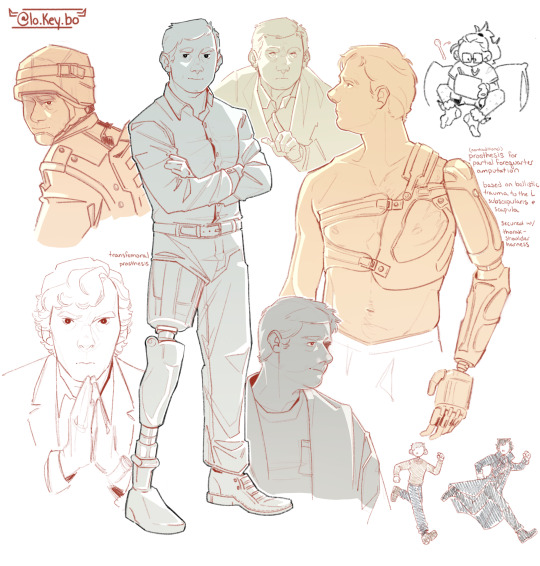
new year, old john watson doodles^^
#was toying with a few concepts because i think there needs to be more disability representation in media#and every adaptation ignoring john watson’s injuries is gettin on my nerves tbh fr#apologies for any errors regarding the prostheses!#i’m still learning and forequarter amputations can be finicky to find accurate information about#my art#the @ is my insta#i’ll learn how to draw him ONE of these days#art#fanart#fanartist#sherlock#bbc sherlock#sherlock bbc#john watson#sherlock holmes#johnlock#gen#martin freeman#benedict cumberbatch#amputee
678 notes
·
View notes
Text
There is one thing from Star Trek: Discovery that sticks with me. It's the one crewmember in a wheelchair.
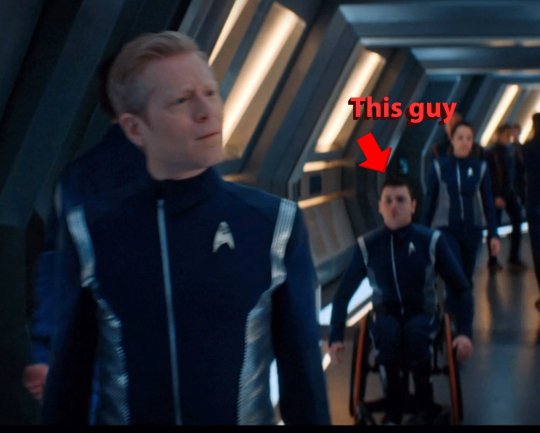
Why? Because in a future where almost any medical condition is curable, being disabled or using a wheelchair isn't seen as something that needs to be fixed.
Does he have a name or a backstory? No. But unlike Pike (ToS), Emory Erickson (Enterprise), or Admiral Jameson (Next Generation), he's not in the wheelchair because of some tragic accident or illness that left them scarred, paralysed, and/or disabled. He's not made the centre of a story of struggle and pity like Melora Pazlar (Deep Space 9).
There's no story of him trying or needing to be "fixed", "healed" or "cured", there's no story of him trying to adapt, there's no story of him getting in the way or being a burden. He's not seen as a tragic victim. He's not seen as unfit for duty or disabled.
He's just a guy in a wheelchair and a member of the crew.
#this is technically called incidental representation#which is representation of people going about their everyday lives#but this means everything to me#if only my thesis were on wheelchair users in literature and media#star trek#star trek discovery#discovery#star trek: discovery#disability#disability representation#wheelchair users#disabled representation#wheelchair
808 notes
·
View notes
Text
As a disabled person... a disabled person since I was very young (age 2) and will be until I die... I like stories that portray disabled people accurately. It's why I devote a lot of my writing to people with disabilities or chronic illnesses, because I feel like it's important. We don't get to see accurate depictions of ourselves in media, and that representation is dearly, desperately needed, which is why I write them.
I like stories that are well researched, appropriate to the condition, and display a breadth of knowledge on the subject. I like stories where the disability is true, real, and doesn't magically get better.
But... as a disabled person with chronic pain, who requires regular, painful surgeries and procedures to keep me alive... I also like the stories where there is a magical fix. I like stories in which the characters who are suffering and in pain, no longer have to suffer or experience pain. Because I dream of a time and place in which I no longer have to suffer or live through the pain of my conditions. And I don't feel like it's wrong to feel that way.
I can like both. I can appreciate both. I see the value of both. And I know there are a lot of disabled people who disagree, that fiction should be true to reality in terms of disability, and I understand and respect the argument. I understand why they feel that way, and to some extent, I agree. But fantasy is fantasy for a reason, and I can do or say or be anything I want to be in fiction. What I want is to see myself, but sometimes, I want to see a version of myself that isn't suffering. And I don't think that's unfair.
#Personal#The Traveler Speaks#Disability#Disability in Media#Disabled Representation#please feel free to reblog
198 notes
·
View notes
Text

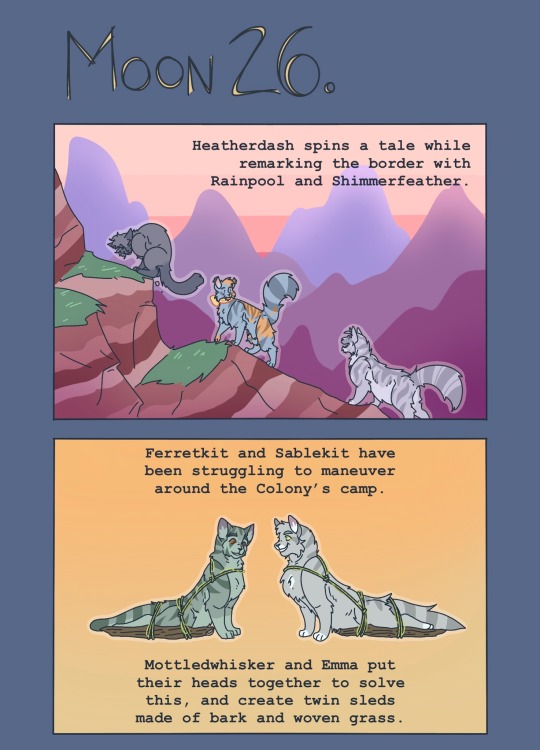
#tgwk episode#clangen#clangen art#warrior cats#i had a lot of help trying to make something for ferretkit and sablekit to use and im so grateful for it#if theres anything i want to do right by its the disabled community esp when it comes to representation in warrior cats media
174 notes
·
View notes
Text
“Bad Representation” is actually a topic I’m really passionate about and interested in, I could talk about it for ages. The way people handle “Bad Representation” as a concept is genuinely fascinating, too, so this is both an analytical fascination and an anthropological one.
For clarity, I thoroughly do believe there is such thing as “Bad Representation”, especially when it comes to expressions of pure bigotry from the person doing the representing… But I personally think everyone’s bar for what counts as “Bad Representation” is set a little bit too strictly, has no real account for capitalistic and/or historical restrictions - For Example: Language and common understanding of queer identity being far different in the 1950’s than it is now, and Studio Meddling - and also, interestingly, tends to take no account for the opinion of those getting “represented”, or the idea of individual satisfaction.
There’s been many, many times where a character is objectively pretty bad representation by modern standards, but discussion surrounding it takes no account for the concept of Resonance. Sometimes a character is not “Good Representation” as an objective concept, but they are relatable, likable, and quite fun to watch. I’ve seen quite a few instances of people talking down to the mentally ill or disabled for enjoying a Slasher in part because of their disorder/disability, or queer people for enjoying Hays Code villains. Sometimes a character isn’t written kindly, or isn’t written well, but they really resonate with you… And that counts for something.
One of my favorite characters - one who has helped me come to terms with my cPTSD and OSDD - is a representation of PTSD + DID that is objectively not very good. He’s basically a Vietnam War veteran, who gets an Alter in the middle of the war that is basically a self defensive Murder Mode. It’s literally the PTSD from The War and Evil Alter cliche, but there’s just some aspects that really hit for me, like the fact that he’s considered the nicest, kindest person in the cast, and the alter is portrayed clearly as being in constant self defense mode, thinking he’s still in the middle of the war, and also being quite silly. There’s several details I view as being done pretty well, a whole arc about him grappling with his mental health in a way I find quite fascinating and visceral, and I enjoy him quite a lot! But many would agree that he’s “Bad Representation” because of the War PTSD and Evil Alter tropes. Even I agree that those things kinda suck, but that’s not stopping the fact that this character has meant a lot to me, and that I really would not be the same level of okay with myself if I hadn’t discovered this character.
I’ve caught flack for this. I’ve seen many other people latch onto a character who is not executed very well because they find them personally relatable, or are using them to figure some things out about themselves, and also catch flack for it because the character is not “Good Representation” for a group as a whole. No account for Resonance, no account for Individual Experience. It’s a fascinating lack of a sense of nuance.
I think people have forgotten - or perhaps do not realize - that criticizing a base concept, or base execution of a concept, is different from criticizing individual experience. It’s like the difference between criticizing the makeup industry vs. criticizing someone’s personal choice to wear makeup. It is good to point out when something is written or executed poorly, but you do not know the reason why that one individual disabled person enjoys a poorly written character who shares their disability. I would even say that they probably know more than you do that it’s written badly, because they have lived that character’s disability and you likely have not. I think you should maybe step off if a blind person really likes Terezi or something. You do not need to patronize them by telling them that she isn’t “Good Representation” because her quirk isn’t screenreader friendly, and that her blindness has a magical workaround. I think they already know that these are facts about her that are true. They like her for a reason, and that reason is Resonance.
#homestuck#media analysis#disability#representation#bad representation#good representation#nekro.pdf#nekro.txt
85 notes
·
View notes
Text
i need more media rep of disabled friendships. autistic friendships. social anxiety friendships.
i don’t need media with abled people being friends with a disabled person. i don’t need an allistic being friends with an autistic person. it’s not bad; i just want them both to be autistic. i want them both to be disabled. i want them both to have ocd, depression, anxiety, or anything else.
like troy and abed. sorry to fandom post on this blog but: troy needs things explained to him clearly or he gets confused; abed needs help with social cues and other stuff. like they both need each other and help each other and i love it.
i love that they care about and understand each other in a way that does not come from an allistic person trying to see a different experience and life to theirs; i love characters that look to eachother and see parallel but diverse experiences and their desire to help comes from the same place as their experience of needing help. 🌹🌹
105 notes
·
View notes
Text

why couldn't my autistic ass fixate on something normal for once who the hell is okina matara??!?!??!?😂👎😂👎😂👎
#old ass woman#okina matara#hsifs#my art#digital art#yippie i love clinging to disabled representation in media#touhou#touhou fanart
195 notes
·
View notes
Text
Alright, who was gonna tell me that X-Men was the best allegory for disability currently on tv-
#x men#x men movies#x men first class#20th#20th centery fox#marvel#disability#disabled#disabilties#disabled representation in media#I mean by the end one of them is like- real world disabled- I don’t see how they could make this shit any clearer
1 note
·
View note
Text
How The Owl House did amputee representation right before Eda ever lost her arm - Disability in Media
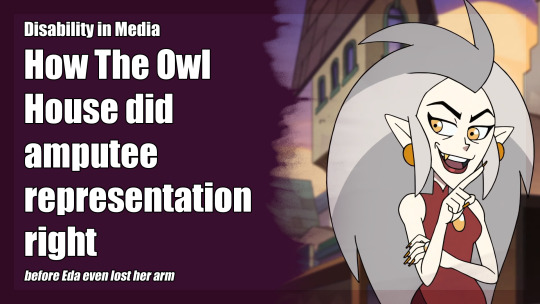
[ID: A screenshot of Eda from The Owl House, an old woman with pale skin, very large, grey hair and pointed ears in a red dress. Beside the screenshot on a dark pink background is text that reads "Disability in media, How the Owl House got amputee representation right before eda ever lost her arm." /End ID]
Dana Terrace's The Owl House has some of the best disability rep I’ve seen on a Disney channel show in a long time, with Eda, the main character’s mentor, being one of many stand-out examples.
Plenty of people have discussed how Eda’s curse and the loss of her magic can work as an allegory for disability and how refreshing it is to see a story (especially one aimed at a younger audience) who’s focus is not on her “overcoming” it, but learning to accept it as a part of her and go from there. Eda’s story tackles a lot of subjects that are often mishandled in other examples of disability representation, from the subject of parents who refuse to accept, to glass siblings and much, much more, The Owl House handles all these topics beautifully.
But one thing that dawned on me during my most recent re-watch of The Owl House is how well Eda (and later Lilith) worked as amputee representation, long before Eda actually lost her arm.
One of the side effects of Eda and Lilith’s curse is that sometimes their body parts, mainly their limbs, can fall off. It doesn’t hurt them, and Eda is seen removing them intentionally at multiple times in the series, but they can always be reattached.
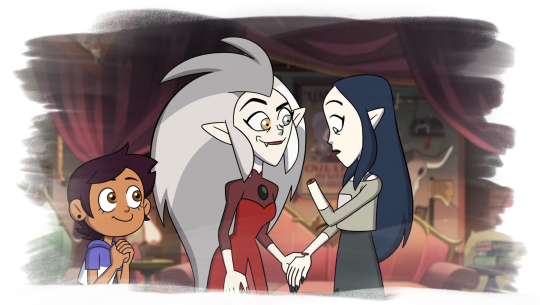
[ID: an image of Eda holding her sister Lilith's hand. Lilith is a pale woman with long, black hair, wearing grey clothes. She is looking at her other arm suprised, as her hand is missing. Luz, a Latina girl with short brown hair and a purple hoodie is looking on, smiling. /End ID]
While most likely unintentional, the way the show depicts this with Eda in particular is exactly what I wish more people would do with their prosthetic-using amputee characters.
Eda detaches her limbs, especially her legs, when they’re inconvenient or when she’s relaxing.

[ID: an image of Eda laying on the couch in a bathrobe, her hair in a towel. She has taken her legs off, throwing them to the other side of the seat. /End ID]
The fact that this is mostly played for laughs is actually a good thing in my opinion (though obviously, the show’s overall tone is part of that), as it shows the audience who are mostly children and teens, that in a world of weird and downright scary (from the perspective of the characters) things, this isn't one of them. It’s just a thing she and Lilith can do, and it can even be funny.

[ID: An image of Luz and Eda dressed as pirates. Eda is sitting on the ground, her legs detached and off screen somewhere. /End ID]
It does startle Luz and Lilith on a few occasions, but that’s more because they didn’t know the curse could do that, but once they’re introduced to it, it’s never really brought up as a big deal again.
I’d love to see more amputee characters who do this with their prosthetics. So often media is almost afraid to have amputees take their prosthetics off on camera or on the page. For some folks, our prosthetics are like a part of our bodies, but that doesn’t mean we never take them off. Show your leg amputee flop on the couch and throw their legs across the room. Have them go without on occasion, not because they have to, but because they just don’t feel like putting them on.
Likewise, the owl house creators never shy away from showing Eda when her limbs aren’t all attached. A lot of media, and kid’s shows in particular, will avoid having an amputee character’s stump visible if they ever do take their prosthetics off - treating that part of the character’s body the same way they treat gore or nudity. I’ve talked before how this actually does have a real impact on how kids in particular react to amputees - I’ve legitimately had kids I worked with cry when I took my prosthetics off, then immediately calm down when they see there’s nothing "scary" under my socks.
As much as I love How To Train Your Dragon, it’s very guilty of this. Hiccup looses his leg at the end of the first movie, and wakes up with his prosthetic already attached. The Netflix series has a few instances where he has his prosthetic off, but the camera almost always avoids showing it until he can cover it up again, or is super zoomed-out so you wouldn’t be able to “see anything”. To their credit, they do get better with this in the last movie (though it's still always covered), but for the majority of the series, they are very reluctant to have any shots where hiccup’s leg is in view without the prosthetic (unless they’re very far away).
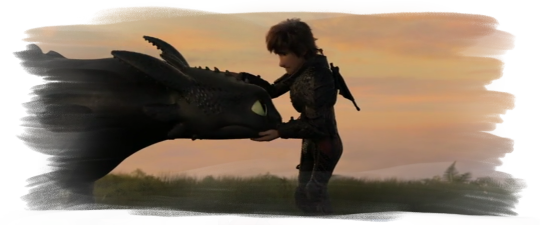
[ID: a screenshot of Hiccup from How To Train Your Dragon 3, a white man with short brown hair, and one leg missing, wearing armour made of black dragon scales and no prosthetic. He is holding onto toothless's head, a black dragon. /End ID]
Ironically, Eda does (permanently) loose an arm at the end of season 2, but I don’t really have much to say about her as amputee representation on that front, since she’s absent for a lot of Season 3, and when we do see her again, everything is so hectic, the story doesn’t really have any time to focus on her missing limb (which is reasonable). I will say, I do appreciate that they kept the amputation when she's in her owl-beast form in the finale, but there's honestly not much more to say about it. We do see her again in the epilogue after she’s had some time to settle into the amputation, wearing a hook prosthetic, but it’s, once again, too quick to really say anything from a representation standpoint. There's a few little nit-picky things I could bring up, like the fact they seemed to change the type on amputation she had (when she looses it, we see the split was very close to the elbow, but in the epilogue she has most of her forearm again) but those read to me more like animation mistakes or an odd prosthetic/clothing designs rather than a representation issue - and as someone who's worked in animation, given the stress the team was under for the finale, I'm not really worried about it. Like I said, it's more nit-picky than anything.

[ID: A screenshot of Eda, her hair tied back and wearing a red robe and a hook for her right hand. /End ID]
Despite all that though, I still think Eda is still good amputee representation, but mostly because of how they depict her curse’s side effects rather than her actual amputation. She’s honestly one of the only characters that I think you could refer to as “amputee coded” (outside of maybe Teen Titan’s Cyborg), and I genuinely wish more creators would treat their actual amputee characters the same way the Owl House treats Eda in that regard.
#Writing disability with Cy Cyborg#Writing Disability#Disability#Disabled#Disability Representation#Writing#Writeblr#Authors#Creators#Writing Advice#Disabled Characters#On Writing#Disability in Media#The Owl House#TOH#Eda#Owl House#Eda The Owl House#eda clawthorne#eda the owl lady
659 notes
·
View notes
Note
Hi Elliot! I'm wondering what your stance is on consulting for the creative projects of others? I have average height friends, for example, who would love to have a Little Person as a sensitivity reader for future scripts, and of course I thought of you.
Hello! I'm actually working on a sensativity read on a fantasy novel in the works right now!
If anyone is looking for sensitivity reads, please reach out! I am happy to do them for a commission!!
#dwarfism#sensitivity reader#disability#dwarfism in media#disability representation#dwarf representation
46 notes
·
View notes
Text
Thinking about Superstore refusing to define Garrett's backstory by how he was disabled. Thinking about how they had Garrett say "it's gonna put me in a box. And I don't want that". Thinking about how they chose to define Garrett's character around his relationships and attitude instead of his disability. Thinking about how many times disabled people are defined by their disability. Thinking about how many times disabled people are asked why they are disabled and expected to explain. Thinking about how nice it must be to not be defined by that.
#media#disabled representation#disabilties#disabled#disability#disability representation#garrett superstore#superstore#Superstore garrett#garrett mcneill
117 notes
·
View notes
Text
March 21st is World Down Syndrome Day
This article has a list of amazing artists and performers with Down Syndrome to check out!
#Down Syndrome#World Down Syndrome Day#DownSyndrome#Disabled Actors#Disability Representation#Representation#Representation Matters#Disability Pride#Media#Entertainment#Sophia Jirau#Zack Gottsagen#Jamie Brewer#Actors#Models#Broadway#Theatre
32 notes
·
View notes